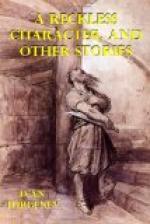[13] A folk-tale narrates how the Tzar Arkhidei obtained his beauteous bride by the aid of seven brothers called “The Seven Semyons,” who were his peasants. The bride was distant a ten years’ journey; but each of the brothers had a different “trade,” by the combined means of which they were enabled to overcome time and space and get the bride for their master.—TRANSLATOR.
[14] The word used in Russian indicates not only that he was a hereditary noble, but that his nobility was ancient—a matter of some moment in a country where nobility, both personal and hereditary, can be won in the service of the state.—TRANSLATOR.
[15] The change to thou is made to express disrespect.—TRANSLATOR.
[16] A simple card-game.—TRANSLATOR.
[17] The word used is popadya, the feminine form of pop(e), or priest. Svyashtchennik is, however, more commonly used for priest. —TRANSLATOR.
[18] June 29 (O. S.), July 12 (N. S.).—TRANSLATOR.
[19] In former days the sons of priests generally became priests. It is still so, in a measure.—TRANSLATOR.
[20] Therefore, there would be no one to maintain his widow and daughters, unless some young man could be found to marry one of the daughters, be ordained, take the parish, and assume the support of the family.—TRANSLATOR.
[21] Parish priests (the White Clergy) must marry before they are ordained sub-deacon, and are not allowed to remarry in the Holy Catholic Church of the East.—TRANSLATOR.
[22] A sourish, non-intoxicating beverage, prepared by putting water on rye meal or the crusts of sour black rye bread and allowing it to ferment.—TRANSLATOR.
[23] One of the ancient religious ballads sung by the “wandering cripples.” Joseph (son of Jacob) is called by this appellation, and also a “tzarevitch,” or king’s son. For a brief account of these ballads see: “The Epic Songs of Russia” (Introduction), and Chapter I in “A Survey of Russian Literature” (I. F. Hapgood). This particular ballad is mentioned on page 22 of the last-named book.—TRANSLATOR.
(N.B. This note is placed here because there is no other book in English where any information whatever can be had concerning these ballads or this ballad.—I.F.H.)
[24] Ecclesiastics are regarded as plebeians by the gentry or nobles in Russia.—TRANSLATOR.
[25] In the Catholic Church of the East the communion is received fasting. A little to one side of the priest stands a cleric holding a platter of blessed bread, cut in small bits, and a porringer of warm water and wine, which (besides their symbolical significance) are taken by each communicant after the Holy Elements, in order that there may be something interposed between the sacrament and ordinary food.—TRANSLATOR.
[26] That is, the particle of bread dipped in the wine, which is placed in the mouth by the priest with the sacramental spoon. —TRANSLATOR.




